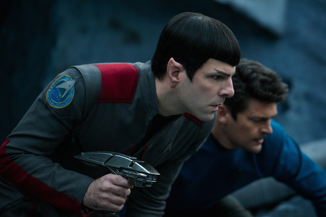Movie Review: Star Trek Beyond
By Matthew Huntley
July 27, 2016
BoxOfficeProphets.com

And yet, just like the other prequels, Beyond has its virtues. It's basically sci-fi comfort food. On the outside, it's slick, charming, and genuine at times, and the actors make their characters perfectly convincing and likable. We also marvel at the special effects and sharp, expansive imagery that fills the entire screen, even in the far corners. The screenplay may not give us a lot to think about, but the visuals certainly give us plenty to gaze upon, often with wonder, and so the movie at least holds our attention. But, in the end, its superficial qualities only go so far, and because they are so strong with these movies, it's even more of a shame they don't have a deeper, richer substance upon which to attach themselves.
Once again, the conflict is rather simple and watered down. The men and women of the starship Enterprise do battle with a new, bitter villain named Krall (Idris Elba), a supposed alien commander who has intentions to destroy the Federation's latest space station and then the entire Federation itself. A troubled past has left Krall feeling betrayed and vengeful, but any more about his motivations or who he really is I cannot say at the risk of giving away crucial details. Just know the big “reveal” at the end isn't as revealing as we hoped. In the grand scheme of things, this is just another stock “villain who wants to destroy all that is good and humane” type of plot. I wish I could say it's more complicated and involving than that.
Captain James T. Kirk (Chris Pine) and his loyal crew - Mr. Spock (Zachary Quinto); Uhura (Zoe Saldana); Dr. McCoy (Karl Urban); Scotty (Simon Pegg); Sulu (John Cho); and Chekov (Anton Yelchin) - first get mixed up in Krall's scheme when they receive a distress call from an alien named Kalara (Lydia Wilson), who pleas for help when she says her ship is caught in a nearby nebula. When Kirk and company set out to rescue her, they discover Kalara's entreaty was just a ruse to lure them in so Krall's army could ambush the Enterprise and obtain the other half of an ancient weapon that Spock keeps stowed away. The artifact has the power to destroy many life forms in one fell swoop, so it's only natural Krall would want to bring the two pieces together.
The attack all but destroys the Enterprise and disbands the crew, sending them to various locations around space with limited resources. All this comes amidst the characters' changing lives and personal struggles, including Kirk feeling unsure of his captaincy and the purpose of the Enterprise's five-year-mission to discover new worlds. He fears he's no longer cut out for the role and strongly considers a more grounded position as Vice Admiral. Spock, too, thinks he might leave so that he can continue Admiral Spock's (Leonard Nimoy) work on Vulcan, which is why he ends his romantic relationship with Uhura, despite her reluctance.
Of course, the whole Krall dilemma ends up giving each of the characters a chance to reaffirm their dedication to the Federation and remember why they joined Starfleet in the first place. You get no points if you guess they decide to stay together in the end (it's not like I'm giving anything away since this is, in fact, a prequel and we know the crew's future missions will eventually become the TV series and other movies).
I've always been on the cusp of recommending these latest Star Trek installments. They are, after all, well made on a technical level and fulfill their promise to be action-packed blockbusters, with each one yielding a consistent rhythm and energy. Plus, I admired how Simon Pegg and Doug Jung's screenplay took into account Leonard Nimoy's real-life passing and worked it into the story, and made Sulu a gay man with a husband and child (this is likely a reflection of George Takei, the actor who played Sulu in the original series and is an outspoken gay man in real life). Die-hard fans will have little cause for complaint because Beyond probably gives them exactly what they want in a Star Trek movie.
But giving fans what they desire isn't the same as giving them what they deserve. Because we've been so dedicated to the material for so many years and through so many iterations and multiple adventures, on both the big and small screens and in literature, the filmmakers should have rewarded us not with something they know we're simply going to accept but instead with a story that takes risks and, as I said in my review of Into Darkness, “tests the pre-existing characters in ways we haven't seen before.” Why they've once again chosen not to is baffling given their resources and the predecessors' box-office success. Then again, part of the reason the new Star Trek movies are so successful may be because they are so harmless and familiar. But I say to the filmmakers: try and offend us by going off in a bold, new direction. We may not like it, but an interesting failure would likely be more satisfying than mere “filler material.”